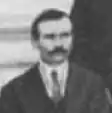Fedor Kalinin
Fedor Ivanovich Kalinin (Russian: Фёдор Иванович Калинин; 1882–1920) was a Russian revolutionary, literary critic and writer.
Fedor Kalinin | |
|---|---|
 Fedor Kalinin at the Presidium of the National Proletkult Organisation elected at the first national conference, September 1918 | |
| Native name | Фёдор Калинин |
| Nationality | Russian |
| Genre | Proletarian literature |
| Subject | Culture |
| Literary movement | Vpered, Proletkult |
| Notable works | ''The Proletariat and Creativity |
| Years active | 1906-1920 |
| Relatives | Mikhail Kalinin (brother) |
Fedor was the younger brother of Mikhail Kalinin. He was originally employed as a weaver, a job his father had.[1]:176 He attended the Capri Party School where he met Alexander Bogdanov and Anatoly Lunacharsky and with them set up Vpered'.[2] He wrote concerning philosophy with an approach adapted by Bogdanov in The Philosophy of Living Experience published in 1913.[1]:176
Kalinin was secretary to the "Circle of Proletarian Literature" established by the Russian Social Democratic Labour Party in Paris in 1913.[3]
He was elected to the Central Committee of Proletkult in October 1917.[4] Following the Bolshevik decree of 22 November [O.S. 9 November] 1917, the People's Commissariat for Education was established with a Department for the Assistance of Independent Class Educational Organisations. Kalinin was the head of the department, but the chair and two further members of the Department collegium would be directly elected by Proletkult. He was one of the editors of Proletarskaya Kul'tura with Pavel Lebedev-Polianskii.
Works
- The Proletariat and Creativity
- Ideology and Production (1922) Moscow:Glavpolitprosveta (Biblioteka vserossiĭskogo proletkulʹta)
References
- Jensen, Kenneth (1978). Beyond Marx and Mach. Dordrecht: D. Reidel Publishing Company.
- Glenny, Michael. "Revolutionary Silhouettes (Kalinin) Footnote". www.marxists.org. Retrieved 31 December 2018.
- Biggart, John (1989), Alexander Bogdanov, Left-Bolshevism and the Proletkult 1904 - 1932, University of East Anglia, p. 150
- Fitzpatrick, The Commissariat of Enlightenment, pg. 90.